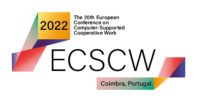Accessibility Guidelines for Submissions
Accessibility Guidelines for Submissions
The PDF format can lead to major accessibility problems, especially for screen reader users. In order to support those among us who need accessible PDFs, ECSCW is working to improve the accessibility of our PDF proceedings. We are asking all authors to make their camera-ready submissions accessible.
The ACM Special Interest Group on Accessibility (SIGACCESS) has done extensive work on how to produce accessible PDFs, and they allowed us to share their guidelines.s you prepare your document, follow the instructions from the SIGACCESS Guide to an Accessible Submission for [MS Word] or [Adobe Acrobat]. Also, refer to their guide for information on how to prepare the final accessible PDF.
Ensure that you:
- Mark up content such as headings and lists using the correct Word template style or LaTeX markup.
- In figures and legends use different shapes and patterns to provide a means other than colour to visually distinguish elements.
- Provide a text description for all figures (see the SIGACCESS Guide to Describing Figures).
- Create every table as a real table, not an image, and indicate which cells are headers.
- Create every equation as a marked-up equation, not an image.
- Set the metadata of your document.
If you are a LaTeX user or MS Word on macOS user, please be aware that you may run into challenges with generating an accessible PDF. We ask that you do your best but we understand that it may not be possible to generate a fully accessible PDF from the source document. You will need a tool such as Adobe Acrobat Pro to add accessibility directly to your PDF. You can do a basic check of your PDF’s accessibility using Adobe Reader’s Read Out Loud tool and Apple’s built-in reading tool, but be aware that these are not full-featured screen readers and will not check all key accessibility features. We recommend using Adobe Acrobat Pro and conducting a full accessibility check (Go to the ‘Advanced’ menu. ‘Accessibility’. ‘Full Check).
If you have questions or need assistance, please contact the conference accessibility chairs at the ECSCW 2022 conference.
Accessibility & Diversity Chairs
For any queries, please, do not hesitate to contact the ECSCW 2022 Accessability & Diversity Chairs.


